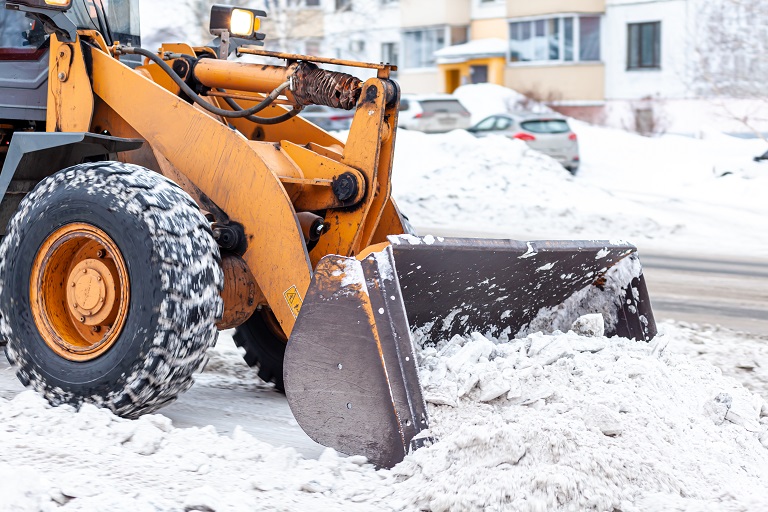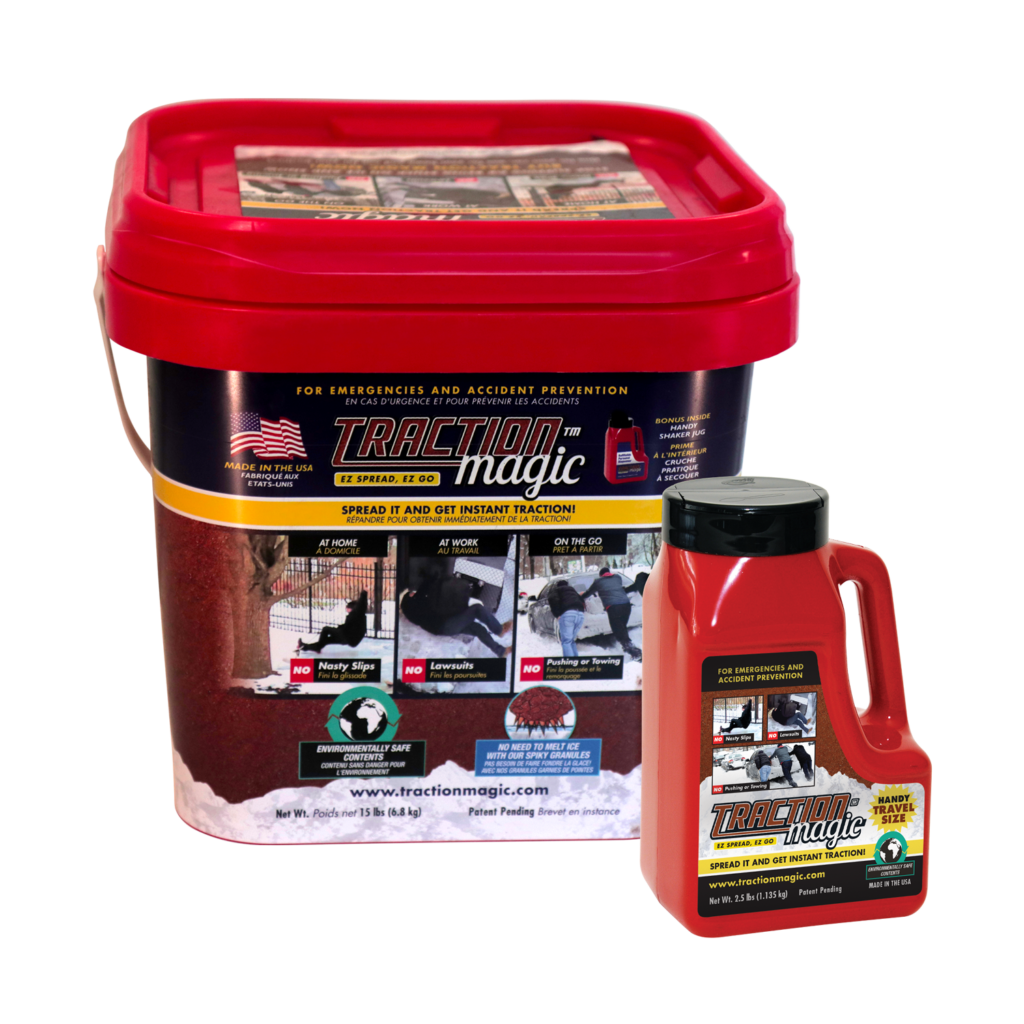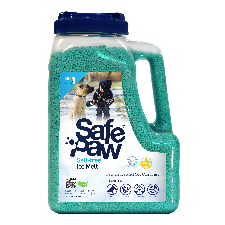Ice Melt For Asphalt: 7 Answers To The Most Frequently Asked Questions

When we talk about the best ice melt for asphalt and concrete, we often wonder whether it is a good option. With several misnomers doing the rounds, it leaves us confused and worried if we should be using ice melt at all. Some ice melt products have a stronger composition as compared to others.

When we think of the best ice melt for asphalt driveways and roofs, a few questions play on our minds. Let us take a quick look at them.
- Can I use ice melt on the asphalt driveway?
Yes, you can use ice melt on your asphalt driveway. It is much stronger than concrete and does not damage the surface easily. While you have multiple options in the market, the safest is to use natural salt-free ice melt.
- How do I know the best ice melt for asphalt and concrete driveways?
Asphalt is a tough material that does not get damaged easily. You can start with rock salt for the pavement and the driveway to check the potent effects of rock salt on asphalt. Professionally installed asphalt is designed to bear extreme freeze and thaw cycles during winters.
- Does ice melt create potholes in the asphalt driveway?
Hot-mix asphalt pavement and driveway surface comprise stones, petroleum, and sand. Potholes are not directly a result of applying rock salt or any deicing compositions. They are caused by cracking of the asphalt surface due to a shoddy driveway job, and if not sealed on time, it will lead to bigger cracks and no ice melt will work.
- Will ice melt stain my asphalt surface?
It is advisable to not use ice melt on the improperly cured or porous asphalt surface and new concrete or precast concrete less than a year old. Even the best ice melt for asphalt driveway may cause staining.
- What is the best way to apply ice melt on an asphalt driveway?
Overusing ice melt can lead to the surface getting corroded quickly and leaving unwanted residue. While many believe the more ice melt we use, the better it is to remove ice; however, the opposite is true. Use less ice melt on asphalt and concrete surface and spread it evenly. Whether it is rock salt, magnesium chloride, or carbonyl diamide, it is advisable to follow instructions.
- How can I prevent ice from settling on the asphalt surface?
If you apply the ice melt on asphalt before the first snowfall, there is less chance of ice sticking to the surface. It will also help you clear the driveway quickly.
- Can rock salt damage my asphalt driveway?
Yes, rock salt can damage unsealed asphalt surfaces and driveways. It will accelerate the freeze/thaw cycle, thus causing long-term repercussions.
Asphalt vs Concrete Cost: Which Makes More Sense With Ice Melt For Asphalt?
After learning about the effects of deicers, a natural next question people often ask is: what’s the real difference in asphalt vs concrete cost, and does it matter when choosing an ice melt for asphalt?
At first glance, asphalt tends to be cheaper to install. It costs less per square foot, cures faster, and is easier to repair with patching jobs. Concrete, however, has a longer lifespan when maintained correctly and often ends up costing less in the long term. But the big factor here is how each material responds to winter treatment.
Concrete can suffer from scaling, cracks, and salt intrusion more easily. That’s why you have to be extremely cautious with what you spread on it. Asphalt, on the other hand, is more flexible and can handle freeze-thaw cycles better, making it seem more forgiving. But here’s the catch—using harsh salts still accelerates deterioration. Even if the upfront asphalt vs concrete cost favors asphalt, repeated damage from chloride-based products may push your maintenance bills higher than expected.
This is exactly where a salt-free ice melt for asphalt pays off. By avoiding corrosive salts altogether, you preserve asphalt’s flexibility and keep repairs minimal. Over ten or twenty winters, that small difference in product choice can be the deciding factor in whether asphalt or concrete was truly the cheaper option.
Ice Melt For Asphalt And The Problem Of Sinking Driveways
Another concern that pops up often is: why is my asphalt driveway sinking, and does ice melt for asphalt play a role? Sinking driveways usually result from poor base preparation, water drainage issues, or soil settling. While ice melt itself doesn’t directly cause asphalt to sink, the wrong kind of deicer can worsen the underlying problems.
For example, chloride salts attract moisture. More water seeping into the soil beneath your driveway means more freeze-thaw cycles, which can loosen the base material. Over time, this leads to soft spots and uneven sinking. If your driveway already has small cracks or porous areas, adding salt just speeds up the process.
A chloride-free ice melt like Safe Thaw avoids this domino effect. By preventing excess water infiltration and not pulling additional moisture into the soil, it reduces the risk of aggravating a sinking asphalt driveway. So, while the immediate thought might be to blame “construction quality,” the deicing product you use in winter can absolutely tip the balance between stability and costly repair work.
If you’re already dealing with mild sinking, sealcoating and professional patching can help restore evenness. But for prevention? The solution is clear: switch to an ice melt for asphalt that protects, not one that accelerates damage.
Can Asphalt Melt? Let’s Talk About This Common Misconception
Here’s an interesting one: some people ask, can asphalt melt under extreme heat or from the chemicals in deicers? The short answer is yes—but not in the way most people think. Asphalt itself begins to soften when exposed to very high temperatures, usually above 140°F, which is why you may see tire marks or depressions on hot summer days. But in winter? No, asphalt won’t literally melt from the cold or from ice melt products.
What actually happens is more subtle. Strong chemicals, especially chloride-based ice melts, can break down the binding agents in asphalt over time. Instead of “melting,” the surface becomes brittle, leading to small cracks that widen with repeated use. Think of it less like asphalt turning into liquid, and more like it losing its strength piece by piece.
This is why a safe, non-corrosive formula is key. Products like Safe Thaw don’t interact with asphalt in a way that compromises its binders. Instead, they sit on the surface, doing their job of melting ice while keeping the structure intact. So while you might joke about whether asphalt can melt, the real concern is whether your ice melt product is eroding its strength behind the scenes.
Long-Term Care Tips With Ice Melt For Asphalt
So now that we’ve addressed the cost, the sinking issue, and the “melting” myth, what’s the best way to care for asphalt during winter? The secret lies in prevention and moderation.
- Pre-treat before storms. Applying ice melt for asphalt before the snow falls helps reduce bonding and makes shoveling easier.
- Apply sparingly. More doesn’t equal better. Spreading a thin, even layer is enough to activate the product without overloading the surface.
- Sealcoat regularly. A sealed asphalt surface resists water penetration and deicer effects better than an untreated one.
- Avoid chlorides. This is the most important step. Chloride-free products protect your driveway while still giving you the traction and melting power you need.
Think of your asphalt driveway like a leather jacket. With the right care products, it can last decades, looking sharp and doing its job. With harsh, abrasive treatments, it wears out prematurely, costing you more in replacements. Choosing Safe Thaw or similar products is like picking conditioner over sandpaper—it just makes sense.
100% salt & chloride-free, fast acting Ice Management Solution
Conclusion
The conversation around asphalt isn’t just about whether you can use ice melt—it’s about choosing the right one and understanding the long-term consequences. From asphalt vs concrete cost to the risks of an asphalt driveway sinking, and even the question of can asphalt melt, it all comes back to the same answer: your winter maintenance choices matter.
Using a salt-free ice melt for asphalt like Safe Thaw not only keeps your driveway safe in icy conditions but also protects your investment for years to come. Instead of patching cracks, fighting stains, or resurfacing prematurely, you’ll enjoy a driveway that does what it was designed to do: provide strength and safety without constant worry.
So, the next time winter rolls in, don’t reach for a bag of rock salt. Reach for a solution that respects your asphalt, your budget, and your peace of mind. Because the best ice melt isn’t just about clearing snow—it’s about preserving what you’ve built.
Try Also Our Other Winter Safety Products:
Traction Magic
Stay safe on slippery surfaces with a product that’s 100% natural and safe for pets, people, and your property. Whether it’s sidewalks, steps, or even your car’s traction, Traction Magic is the go-to choice.

Safe Paw
The Original and #1 Selling Pet and Child Safe Ice Melt for over 20 years. Guaranteed environmentally safe –It won’t harm animals or children, and it won’t damage your property. That’s Safe Paw. Safe Paw can change how winter affects our planet.


